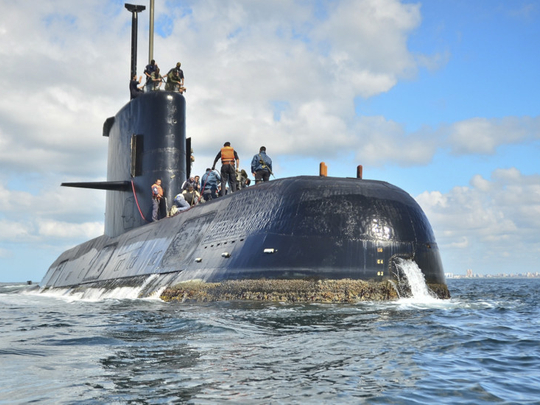
If we do not grow from hard experiences and learn from the pains they inflict, we risk reproducing regrettable situations over and over again, as if some cosmic force were testing us continuously. That is how I see two very different tragedies that share one source: The Argentine navy.
Like an instructive coincidence, just as the 44 crew members of the San Juan submarine were believed to have disappeared, reports emerged of the culmination of the Navy Mechanical School (also called Esma) trials investigating the Argentine armed forces’ role in the “Death Flights”, in the 1970s — when Leftist prisoners were thrown from planes into the sea. The courts gave 29 navy officials life sentences for their collusion in the flights and ensuing deaths of prisoners taken from the notorious Esma. My brother and sister, Nestor and Cristina, were two of those killed this way. They too have disappeared in the depth of the ocean.
There is a disturbing symbolism here, as if an invisible, underground current were linking their destinies and those of the 44 crew members. It is not a forced comparison. Those of us who lost their loved ones back then haven’t had any trouble in forcing our minds to comprehend their deaths without ceremony or goodbyes. The Esma trials have renewed in us a pain now also felt by relatives of the San Juan crew.
If Jung is right, Argentines seem doggedly determined to ignore the deeper causes of their ills and thus are condemned to repeat the periodic deaths of their youth, which should warn them of the things they want to ignore. They duly pin the blame somewhere else, and postpone solutions, hiding them deep beneath falsehoods and ideological prejudices, without seeing the humanity that explodes in such overwhelming and painfully didactic moments.
Forty years separate the old navy of Eduardo Massera, that arrogant admiral who stated at the trial of Junta chiefs, “I am responsible but do not feel guilty,” and this navy, subordinated like all the armed forces to the laws of democracy.
And yet attitudes and hearts in Argentina have not democratised. The uniforms still convey the distrust and secrecy that were the hallmarks of the dictatorship and have survived into the democracy.
Instead of experiencing the ills of the time with a sense of civic responsibility — from corruption to violence, poverty and authoritarian methods — Argentines shift the blame and remain unable to build within their democratic pact a new society free of the stains of the past. Likewise, their fondness for symbolic acts and ideology links younger generations to a dark past of violence, rather than to a truly democratic education that will turn them into citizens who feel responsible for their country’s destiny.
End-of-year barbecues have been held at the Esma school, where they also commemorate the “Death Flights”. Nearby is the Malvinas (Falklands) Museum, where they glorify the same planes that had thrown prisoners into the ocean. Such frivolity ties the country to the past, and impedes a real relationship with its pains. There is no moral superiority in suffering. The Falklands War did not absolve the horrors of the military dictatorship — how could it, when more youngsters, sailors of the General Belgrano battleship, sacrificed themselves in the cold waters of the South Atlantic?
Since modern history has taught us that the end does not justify the means, and a killing is not rectified with another, it might be time now for Argentines to learn from the past and transform themselves into a society freed of hate, distrust and concealment that characterise the authoritarian identity. Justice prevents vengeance and allows people to live together more humanely. That is when we will have learned from the teachings of Jung, who believed that knowledge may be born from our mistakes, but is carried in the heart.
— Worldcrunch, 2017/New York Times News Service
Norma Morandini is an Argentine journalist and a former senator.











